H.B. Berlow's Blog, page 19
May 16, 2021
My 3 Songs
There is a difference between a movie, book, or song that you like and one that really speaks to you. You can, if you think hard enough, determine a work of art that you connect with on a deeper and more personal level. One that, in essence, defines you.
I’ve often spoken about particular songs with my wife, not indicating the notion of “I want these played at my funeral” (even though that is how it winds up sounding). But every time I mention them, there is a kind of resonance that I think it is ultimately worthwhile to refer to them as My 3 Songs.
My friend, Rich, and I saw Stevie Ray Vaughan the year before he tragically died in a helicopter crash. It was at an outdoor venue and we were thrilled to get tickets in the fifth row. What we didn’t realize was the stage was some twenty foot high and we couldn’t see the drummer or keyboard player. However, on a warm summer evening, Stevie sat on the edge of the stage. His snakeskin boots and wide brimmed hat were striking. His silk shirt was blowing in the light breeze. And when the calming tones of Riviera Paradise started up, I was carried away to a soothing place, one unencumbered by any difficulties life may present. This moody, elegiac song was so unlike his Texas blues-rock style. The fact it was written as part of his recovery from alcoholism spoke volumes. I’m not sure about the Riviera part but it is pure Paradise.
While living in Boston in the early 1990’s, I turned to two things which reinvigorated my artistic sensibilities: poetry and Bebop. It wasn’t just poetry but classical forms. And it wasn’t just Bebop: it was Charlie Parker. Bird. I know nothing about the semantics of music, chords and notes, even how to play ANY instrument. But I read about Parker’s process. There was the famous story about reworking the song Cherokee into Koko by basing the harmony on the chord changes. It was through diligence and persistence that Bird “became alive” as he stated. However, it was also the desire to find his own voice, his way of playing sax, the personal stamp to his own art. I set out to write an extended poetical work likening the poets use of words to Bird’s bebop stylings. It was read in part as a Work in Progress on the Tufts University radio station. It was performed live, with friends reading the various voices. And it was recorded on a four-track tape deck by another friend who was a student at Berklee. To this day, it was my greatest achievement in poetry.
Couples are always referring to “our song”, whether it was something they heard on their first date or THE song played at their wedding. That isn’t the case for my wife and I. “Our song” just came out of nowhere. Now, I was raised with a great deal of classical music in my house, so many popular tunes were familiar to me. That being said, how can you have a favorite with someone until you hear it with them? It was the movie Frankie and Johnny that spoke to us. A story about two people who thought they might not find love again. Okay, it was your typical 1990’s Rom-Com but we enjoyed it. On top of which, Clair De Lune played a prominent part in the story structure. Just yesterday, I was driving home from grocery shopping and the song came on from one of my thumb drives. Almost immediately, I was carried away to that “special place” thinking about my wife. The purity of that song fills me with joy, and I know life is good.
There are countless songs I have heard in nearly sixty years on this planet. Jazz and blues and pop and rock and classical and so on. I enjoy listening to music, treasure the craftsmanship, smile at the lyrics. But those three songs define ME more than any other I have come to know.
May 13, 2021
Please allow me to introduce myself!
The process of buying a book seems to follow an established pattern, whether it is online or in a book store. Unless it is a favorite author or by a recommendation, we typically start by noticing the book title and the cover. Publishers harp on the notion of an intriguing thumbnail for websites.
There will be a tag line on the front that is designed to capture your attention, followed by the blurb on the back. Additionally, there is the author’s bio. That’s when it starts to get interesting. As you can see, there are any number of possible stops along the journey that might intrigue you or bore you to the extent of moving on.
Once you get to the information about the writer, you may proceed on to their personal website or their blog or any of their social media profiles. These are the times when you really really want to know about the author. Who are they? What makes them write what they write? What is their process? This, for the uninitiated, is the author’s platform.
Now, from a purely sales and marketing perspective, you want your readers (and potential readers) to know everything about you. Well, at least, everything worthwhile that will help you sell books. Or rather you are selling yourself with the intention of selling your product which is books.
The question then arises as to how much you need to know about the author in order to actually enjoy and appreciate the writing. If someone writes police procedurals, is it important that you learn about their past career in law enforcement? If a political thriller intrigues you, is it relevant whether or not the writer has a background in the military, perhaps Special Ops?
There is a line of demarcation in terms of connecting with the author. Again, with the exception of the well established and longstanding writers who EVERYONE is familiar with, the notion of a connection with an author is significant in terms of sales. It should be that the writing and the quality of the story captivate a reader enough to disappear into that world without an relevant information regarding who wrote it.
I suppose each reader follows their own instincts. But if it is absolutely necessary for you to learn more about me in order to appreciate my works, I am ready to field your questions.
May 8, 2021
Author in Search of a Title
Let me first start out by saying THIS IS NOT A CONTEST. But, feedback is important, so we’re going to try this as a blog post.
I am currently on the second draft of a new historical crime fiction series after the completion of the Ark City Confidential Chronicles. I am eagerly diving into the editing process, fleshing out the story, enhancing all the characters, and continuing my research to determine if everything is accurate.
All along during the development, I KNEW who my main character was to the extent I was imbuing him with more of ME than in my prior works. No problem there. The issue is I don’t have a definitive title. Oh, I’ve got ideas but nothing solid, nothing that would stand out.
So, let’s throw it out there. I’m going to give you a rough idea of the character and the story, present the first two paragraphs, and tell you kind of what I’m looking for. Respond on the blog or wherever this is posted. If someone miraculously comes up with something truly dazzling, they will get something. (But remember this is NOT a contest.) Ready?
Harold Bergman was an up-and-coming beat cop on the Wichita Police Department when he enlisted shortly after Pearl Harbor. Upon his return, he couldn’t bring himself to plying a trade dependent upon what was “legal” considering his war experiences. Neither could he follow his father’s long-held wishes of becoming a rabbi. He chose the middle ground and became a private investigator.
Two cases occur during this first installment: a wealthy businessman wants Harold to get his college aged daughter away from jazz musicians she has been hanging out with, and a colored woman wants him to find her husband who has likely got himself in trouble working under the table for nefarious individuals in order to make extra money.
My desire is to find a title that has some connection to Old Testament scripture. (Remember, Harold is Jewish.) There are themes of vengeance, justice, and retribution as well as a contemplation on Good and Evil (as you would imagine). Here are the first two paragraphs:
I am quite certain it was not my extensive work on divorce cases that brought me to the attention of Albert Whitman. A wealthy businessman who lives in Eastborough could easily go through a divorce between lunch and dinner without breaking a sweat. It was likely the discreet assistance I provided a former city councilman in retrieving his kidnapped daughter from a desperate ex-bootlegger and the notion in certain circles I could be trusted to keep the dirty laundry under wraps.
Over time, I learned any man could develop a taste for killing. Some eat it up with a spoon. Others choke on it and spit it out. After the war in Europe, I could not accept the old-fashioned notion of Law and Order and return to being an officer with the Wichita police department. By the same token, I was not able to bring myself to following my father’s dream of becoming a rabbi. I split the difference and became a private investigator.
Well, if something occurs to you, let me know!
May 6, 2021
Is #DinnerOnTheFly for Plotters or Pantsers?
So, you read the title and the first thing that came to your mind was “What IS #DinnerOnThe Fly?” It started several years ago when my wife and I were at the Old Town Farmers Market in Wichita for the first time in several years. Off the cuff, I commented how it would be easy to put together a dinner from what I could acquire there. Needless to say, my wife was quick to caution me on the availability of certain produce from April to October, etc.
Within a couple of weeks, I put this notion to the test, continued sporadically over the next few years until Covid hit, and even set up a Facebook page (which you are more than welcome to join). It became more than just a culinary challenge. It was an opportunity to support local businesses while at the same time improving one’s health.
After last week’s post involving a crossover between the keyboard and the kitchen, I’ve done some thinking about this process. Once again, we refer to the title: Is #DinnerOnTheFly for Plotters or Pantsers? On first look, we could certainly say the latter. What could be more seat of the pants than walking around and contemplating what kind of dinner to put together based on currently available resources? You chat with the guy from Pappardelle’s Pasta, enjoy some quality conversation with Linda at Graze the Prairie, see if maybe you can find some intriguing garlic from Orie’s, and create a mental menu.
Ah, but after doing this several times, it no longer becomes a impulsive consideration. You become used to it. You know exactly what could make a captivating meal, different and yet fresh at the same time. That does not necessarily mean your spontaneity has evaporated. You simply know how to handle the process and what kind of components will serve your purpose.
When I write fiction, I usually create just enough of an outline to set a course. The character study, the settings, the approximate journey. As is typical, however, characters have a tendency to go their own way, walk their own road. So I follow them. In the end, I am satiated, just as my wife is whenever I return from the Farmers Market.
The most important thing is to be aware of the ingredients available to you, choose them wisely, and if your well laid plans go awry, add some herbs and spices and it will all turn out well. And don’t forget, if by some unfortunate happenstance, the meal truly sucks, there’s always tomorrow night’s dinner.
Bon Appetit and Happy Writing.
May 4, 2021
Cuisine as Genre
It’s important to understand this first: I do the bulk of the cooking for me and my wife. And we’re not just talking grilling and smoking or opening a can of soup. No, I was the one who wanted an Instant Pot. I was the one who wanted a KitchenAid stand mixer and then the pasta extruder and meat grinder attachments. Yeah, the reality is if I could stay home all day and bake bread and muffins and make pasta and sausages, I would.
As for cuisines, I dove into Mexican, Asian, Jewish, German, Italian, and any other interesting thing I could find on Facebook, Pinterest, Instagram, or Tumblr. I’ve got a list of ideas for when I retire including the purchase of a deep freezer to store this stuff. I might even take up canning.
After all these years of cooking and writing, it finally dawned on me while participating in the OWFI Conference, Bridging the Epic Gap that my cooking and writing were more closely related. For years, I referred to both as creative outlets. The notion of taking disparate “ingredients” and forming them into a cohesive whole was easy to grasp. But somewhere this past weekend, the notion of cuisine as genre (or vice versa) became glaringly apparent.
I studied filmmaking and screenwriting at the University of Miami in the early 80’s. Most of my fellow classmates wanted to be Steven Spielberg or the next great MTV video director. In the early 90’s I turned toward poetry and then was involved in some extent in the Boston Slam Poetry scene. It was poetry that provided me an entrance to meet other creatives in Wichita. Then it was short stories and back to full length fiction. From contemporary crime fiction, I segued into historical crime fiction. As of January 20, 2021, I completed the four book series of the Ark City Confidential Chronicles. Now, I’m moving on to a new series.
Both the culinary and literary processes are the same as far as the analogy goes. Preparation, ingredients, following a recipe and then maybe deviating from it, allowing yourself to trust the process, and then having a completed product, whether or not you are ready to share it. Now, I realize there are subtle nuances based on the genre you write (or the cuisine you cook). Ultimately, it is the flavor that protrudes out from the whole, a certain sense that makes it different from all your other work, whatever that work may be.
Of course, making dinner takes a lot less time than writing a novel. “What’s for dinner?” gets replaced by “What are you working on?” In the end, we are only looking for something palatable to offer those joining us at our table.
Bon Appetit!
May 2, 2021
Aphorisms, Part 2
More thoughts on the craft of writing.
Writing is an enhanced view of reality. Reality is writing without the punctuation marks.
Writers need to know when to stop editing and revising and when to let their “little bird” fly off on its own.
Never underestimate the power of a fertile imagination.
Don’t rush through Today otherwise you will be regretting all the Yesterdays.
Writers must write for themselves. The audience is out there. By writing for others, the writer loses his voice.
A reader knows the difference between a haiku and “War and Peace.” A writer doesn’t care. It’s all about the words.
Writing is essentially a solitary craft. There may be support, motivation, and encouragement from outside sources. However, a writer walks a lonely path.
I don’t care what genre you prefer. My question is: Beyond the marketing and the sales and the networking, do you BELIEVE in the writing?
April 29, 2021
AN H.B. BY ANY OTHER NAME
When I was born, the last of four children to George and Gloria Berlow and the only son, I was given the name Hugh Bradley Berlow. As is typical of Jewish families, the letters of my first and middle name were those of deceased relatives. In this case, the H was for my paternal grandmother Harriet and the B for my paternal great-grandmother Bertha. I am told had I been the fourth daughter the selected name was Hilary.
Apparently, in my youth it seemed to be difficult for other children to pronounce my first name. ‘Clue’ and ‘shoe’ were popular options. There were references to the cartoon duck named Hughie and I do recall a now charming nickname of Hugh-cumber. The manager at my first job as an usher in a movie theater, a gruff former Marine, simply said ‘you’ dropping the H altogether.
Throughout college as a filmmaking and creative writing student at the University of Miami, I went by my given name. A friend did suggest I go by H. Bradley Berlow, thinking it would somehow exude a sense of coolness I had not yet mastered.
It was much later there was a sea change. I was married briefly then divorced. After a bit of wayward wanderings, similar to Odysseus, I came back to Massachusetts. I lived in a rooming house with a shared bathroom and kitchen, worked second shift at a self-serve gas station, and started taking the subway into Boston to attend poetry readings.
At one, dubbed Agape by the founders and leaders of the group, I sat in the back of the room the first night I went. I had a small notebook and attentively listened to the offerings of the evening. When all was done, two guys, Tom and Joe, approached me. They were the gracious welcoming types who found a new attendee in their midst.
After they introduced themselves, I spontaneously responded, “I’m H.B.” I had been through a bit in the prior six years and found it necessary to start over, so to speak. I divested myself of a great many possessions, returning to Boston with only ten books and a lot of blank notebooks. I wanted to minimize my life and that’s where the utterance came from.
This was in October of 1990. I was 28. Since then I, in essence, became H.B. I was able to determine social and personal relationships in terms of how I was addressed. Pre-H.B. individuals still called me Hugh. For some of them it has taken a number of years to overcome that. My older sisters never will nor would I expect them to.
My wife of 23 years knows all of this. It’s not as though I was a criminal on the lam with a secret past. Over the years, the abbreviated name got shortened to simply H., which has never bothered me.
The overwhelming point of this dissertation (beyond the “Now you know” aspect) is simply that, as a writer, I do not place much importance on my name. I would have developed along the same lines by virtue of my experiences. It was ending one marriage and turning to poetry that brought me away from the elaboration of screenwriting. It was entering poetry contests in Wichita that brought me into the circle of other writers and artists. And it was those other writers that introduced me to the world of writing conferences where some lasting friendships have been made.
Call me what you will. The journey is the key.
I sincerely hope to see you at the OWFI conference, Bridging the Epic Gap.
April 28, 2021
ARK CITY READINGS
On August 31, 2018, I had an amazing book-signing event. This was unique, different, special. It was to promote the newly released second book of the Ark City Confidential Chronicles, Secrets of the Righteous.
Since the book took place between 1935 and 1938, my neighbor, Rev. Cindy Watson, thought it would be a good idea to have a period cocktail party in her historic midtown home. We created interesting cocktails named in some fashion after the book series. We researched hors d’oeuvres conducive to the time period, including a ham salad canapé and a Jell-O ring (which, yes, I actually made). Attendees were encouraged to dress accordingly.
Some of the photos of this event are included:
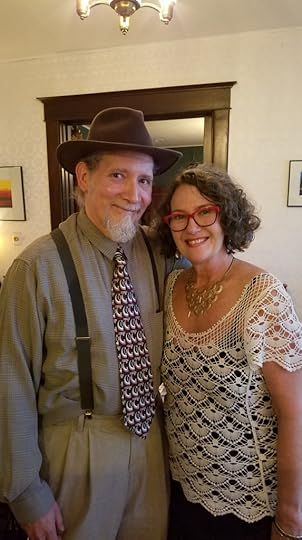
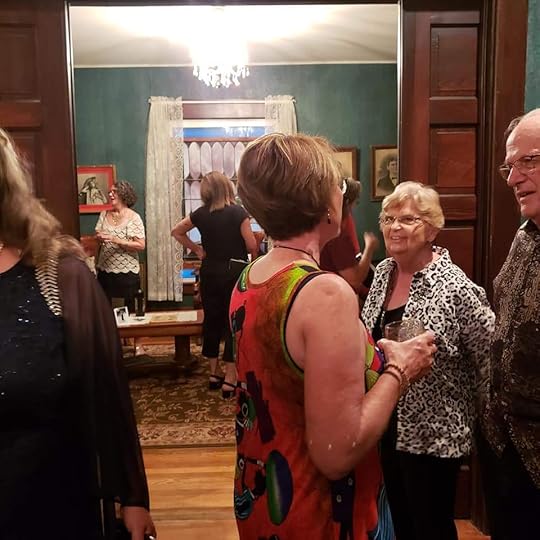
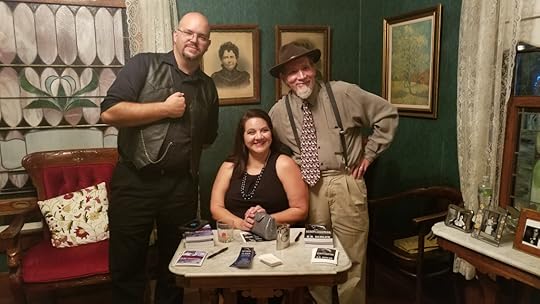
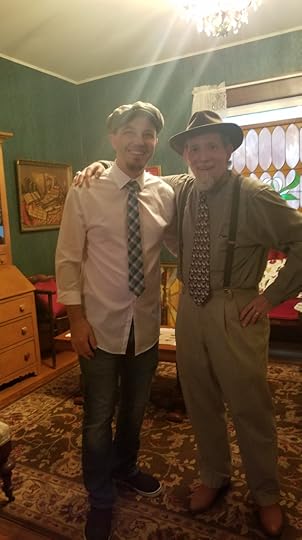
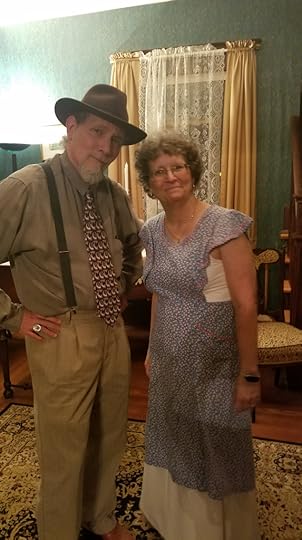
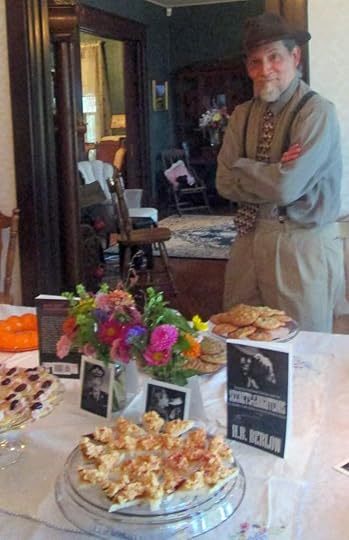
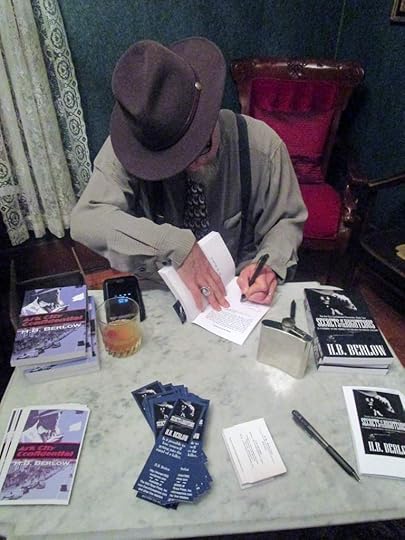
However, I also recorded readings from the first two books that were filmed and edited by the media technician from the First United Methodist Church in downtown Wichita. These played on a laptop on a loop. I am as impressed by the technological aspects as this event as I was by the food, beverage, and turnout. We are both salivating to have another such event.
Please enjoy the video.
I hope to see you all at the OWFI Conference, Bridging the Epic Gap.
April 27, 2021
WHY I WRITE WHAT I WRITE
I am certain there are many readers out there who wonder why a writer writes within a particular genre or in a certain style. To some extent, I suppose writers themselves contemplate that same question.
It took a while for me to contemplate my “journey” such that it is. With relative certainty, I can trace back the steps until this point. Where I go from here has an air of wonder and awe to it.
There is an apocryphal story I’ve told of ten vocabulary words in first grade and a lesson involving using those words in a statement to affirm the student’s comprehension. As I recall (and there is a lot that can be said about my memory), I enjoyed the lesson believing it to be fun.
Throughout my public school career, short stories were the thing, influenced by whatever t.v. show or movie popular at the time or the book I was assigned to read for school. There was only imitation, never a conscientious effort to develop my own voice. At that point, I called myself a writer although I had no business doing so.
I attended the University of Miami ostensibly to study filmmaking, creative writing and screen writing. This was post-Star Wars and pre-Indiana Jones. Everyone wanted to be George Lucas or Steven Spielberg. It was much later I developed an affinity for Hitchcock, Kubrick, and Scorsese. My two major screenplays during those four years was a contemporary version of the Iliad transported to the world of publishing, and a serio-comic look at the world of young independent filmmakers inspired by myself and one of my close associates. Derivative at best.
After a brief marriage, my attention turned toward poetry. I studied classical forms and wrote dirges and sonnets and odes and villanelles, most of them bemoaning my woe begotten state. It was therapy to say the least and an appreciation of something beyond my original intentions.
The first five years of the 1990’s saw my greatest poetic development. I learned to live in the world of Slam Poetry and Street Poetry while maintaining my desire for form and structure. There were like-minded folks that validated my development.
When I moved to Wichita and eventually married, there was a long period of artistic silence. I turned to painting in a pseudo- Jackson Pollock style and this alleviated my writing transition difficulties. Poetry got me an ‘in’ with writing groups but the urge to write fiction was what motivated me.
I’ve surmised that my basically good nature has hidden a darker side, one that will likely never come out. Additionally, while employed in customer service, there was a tendency, at times, to realize that crime fiction was a perfect outlet for any pent up aggression. That’s the direction I took.
There were two books of contemporary crime fiction, now out of print, followed by a series in the historical crime fiction genre. The excitement of research and the digging up of tidbits of knowledge from the past has invigorated me. Simply creating a plot and developing characters is no longer sufficient. Placing them in the world of the past makes it all the more challenging and gratifying at once.
Now, as I move closer to retirement, I wonder what is next. I have stated before the circumstances of my life, the journeys to and fro, have shaped the course of all aspects of my writing. Literary efforts did not lead the way. Consequently, I have no idea where my writing will take me. But to be sure: You’ll be the first to know.
I hope to see you at the OWFI Virtual Conference. We can continue the discussion there.
April 26, 2021
THE THIRD ACT
“There are no second acts in American lives.” – F. Scott Fitzgerald
Given that the author of “The Great Gatsby” died at the age of 44, his proclamation is largely true for him. However, a great many authors and artists and musicians lived well into advanced age. They never stopped being creative individuals. Perhaps the quality was diminished by age and affliction but the desire did not wane.
I can trace the course of my life as a writer through my youth and early adulthood to middle age. Now, a year prior to turning sixty, with planning for retirement and talking about such things, I wonder what my third act might be.
Georgia O’Keefe had sent intermittent periods in the Southwest before moving permanently to New Mexico in 1946. She was 59, the same age as me. She thrived in an environment of pure natural beauty. Though she spent much of her formative artistic years in New York, it was this locale that cemented her status as a true original American artist.
On the other hand, Virginia Woolf struggled with mental illness and depression for a good deal of her adult life. She moved back and forth between London and a country house in Sussex. In this scene from “The Hours”, Virginia pleads to return to the city. Despite the enormous pressures, there is a sense of life that she finds there. She, of course, committed suicide at the age of 59.
Now, when I first met my wife, I was living in Boston. Nothing spectacular in terms of accommodations and nothing to brag about regarding financial security. I have always considered myself a “city boy” and could never imagine myself living on a farm. But as you approach retirement, there are further considerations. Will it be necessary to live in a more bucolic setting due to monetary restraints? Would it be possible to live in a condo (the most approximate thing to an early twentieth century metropolitan living?
I suppose that Choice takes a back seat to Necessity. The tales of our great artists from the past do not include considerations like social security, health insurance, or burial expenses. I hope that age and affliction do not force a diminishment in my work. I am quite certain the desire will not wane.
I look forward to seeing you at the OWFI Conference, Bridging the Epic Gap.



